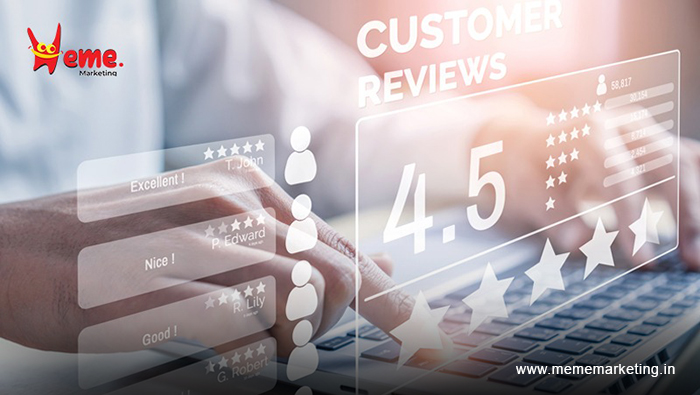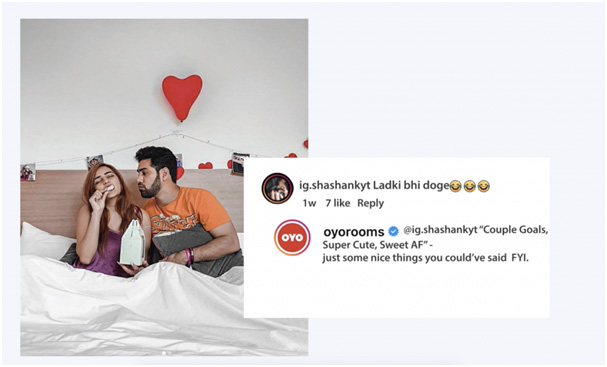
A company’s reputation management is an essential component of business operations because it develops and retains customer loyalty. Online reputation has become just as crucial as a physical one, with the internet now serving as the primary marketing means.
Bad reviews, unauthorized material on propaganda sites, bad press, and misleading news are some of the problems that companies face regarding their reputation. As a result, it is critical that they prevent their internet presence from being tainted by bad reviews and feedback on the internet.
A good example of handling an ORM crisis is the case of the online hotel accommodation provider OYO, which shut out the trolls who were leaving lewd comments about women on its social media posts.

OYO did an Online Reputation Management (ORM) venture in response to inappropriate comments directed at women on its social media platforms, which include Instagram, Facebook, and Twitter.
This ORM responsive mechanism of OYO addressed and educated insulting users during this campaign by sincerely customizing responses to raunchy or disgusting remarks on posts, significantly encouraging them to go with positive comments instead.
ORM tools are typically used mainly through brands to measure negative reactions and respond appropriately. Deciding to take the application of such tools a little further, OYO responded to people who left derogatory comments about women on the brand’s social media accounts.
Within only two weeks, the campaign resulted in a more positive attitude towards women on the brand's social media, along with a 42% decrease in negative statements on OYO (precisely 11 days). OYO also noted a few users removing their offensive comments.
Following OYO’s effective community engagement initiative, the online harassment of women significantly decreased on the brand's social media accounts. The brand’s social media accounts saw a greater proportion of generally positive talk at 26% and 62%, respectively, with only 12% consisting of negative remarks.


As today’s world is rapidly becoming hyper-digital, enhancing business is not as simple as it once was. Tech giant ‘Google’ is the predominant ‘reputation engine,’ and its internet presence has become the real world.
It is a matter of fact that the online presence of brands/businesses has widespread consequences today and can mean the difference between success and disaster.
The popular misunderstanding about Online Reputation Management, especially in India, is that it is only required by those who have a horrible image or inappropriate Google search rankings. When in fact, the online presence of a brand including reviews has a huge impact on its online reputation.
Avoiding even one negative comment or bad review can easily turn into a major problem for the whole company. As a result, businesses must consult meme marketing agency to implement an Online Reputation Management system.
Here are some of the most effective ways to improve the reputation of your online brand.

A brand audit is one of the primary steps to developing an Online Reputation Management plan. Consider all aspects and evaluate your complete online presence, which includes your website, blogs, social media accounts, and third-party business profiles. Also, examine the results of your Google searches.
Constantly monitoring mentions of your brand on the internet is an efficient method for regulating your online presence. Create an alert system for your brand and keyword phrases, and then respond quickly to any of the mentions, both positive and negative. It also includes mentions on social media platforms or in blogs, discussion groups, videos, and others.
It is natural to feel tempted to avoid negative customer reviews in the hopes that they will disappear, but this is not true. Bad reviews provide great opportunities for your brand to deal with complaints head-on, show customer support, and establish a much more active relationship with targeted users. Reply back to all feedback, both positive and negative.
SEO is an important component of Online Reputation Management, however, the approach is a little different here. In the context of ORM, we utilize SEO to rank a variety of websites for only several brand-specific search terms. Thus, you'll be able to drag negative search terms to the bottom of the page and change them with good content that you handle.
Put the spotlight on content that highlights your brand's strengths, such as:
One's online reputation has quite a direct impact on its sales as well. According to Google’s Consumer Insights, 53% of buyers carry out thorough research on its search engine before buying a product.
If new clients see a long chain of bad comments or reviews about your brand, it may badly affect their opinion of your business and cause them to change their decision and immediately make a switch to your competitor.
They are much more inclined to believe in your brand and buy from you if they read a huge number of positive comments and reviews.
Given the pace and power of social media platforms, one bad incident can become viral in a matter of hours, destroying your company's reputation. In 2017, United Airlines staff dragged a passenger out of a flight, and the episode was caught on camera. At over 100 million views, the video rapidly became a social media sensation.
The end result was that United Airlines' market revenue had dropped by more than a billion dollars. The above case, and others like it, demonstrate how damaging bad publicity can be for your brand.
ORM has evolved into a requirement since the day social media usage was amplified and businesses quickly turned their attention online. Irrespective of your industry and company size, tracking, collecting, analyzing, and managing your brand reputation is critical.
A bad reputation has an effect on recruitment, retention, revenues, and the confidence of investors. As a result, working with an agency that knows how Google functions are extremely important.
Inquire about how we can support strengthening your brand's online presence. Visit https://mememarketing.in/
